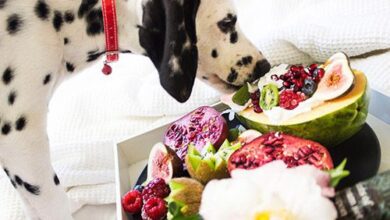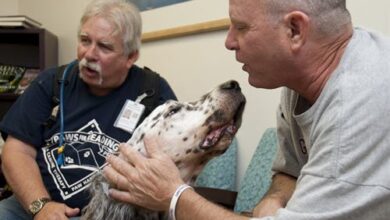How to Feed Your Puppy – Young Dogs Feeding Guidelines
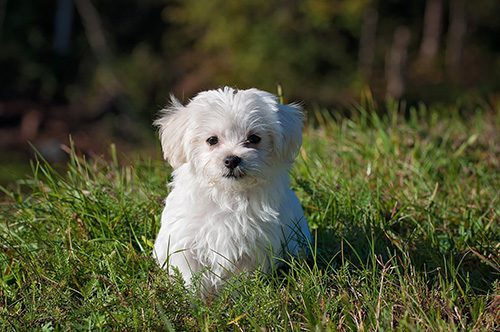

Being in a phase of growth, your puppy has specific contributions and needs related to its development. A quality nutrition is the most important thing to guarantee a good health for your puppy. Taking care of your young dog is also knowing all his needs.
A healthy custom diet is essential for the proper development of puppies. Nutritional advice should be taken with your veterinarian. So how to feed your puppy correctly? and how much food to give him?
The nutritional needs of puppies


For a good development, the puppy needs 2 times more calories, calcium and phosphorus than an adult dog. These 2 elements are very important for the growth, but also for the mineralization of the bones. If the diet is not rich in calcium and phosphorus, the puppy may have growth problems called dysphasia, that is, a joint development problem. The diet must also be abundant in vitamins, minerals and trace elements. Food should be as high in good quality lipids as good skin and coat for your puppy.
Quality nutrition is also important to maintain good immunity in animals. Between the 4th and the 12th week, the puppy will know the immune hole. He will begin to gradually lose the antibody transmitted by his mother. It is at this moment that vaccines take over. In addition to the vaccine, a quality diet will reduce this immune hole and strengthen the defenses of your pet.
Commercial food: why and how?
The ideal is breast milk. It contains exactly what little ones need for good growth. But in some cases, the mother is not able to play her role with them: agalactia (lack of milk), death (eclampsia, for example) or too large reach, and here is the master turned into a substitute mother until at weaning!
It is advisable to feed the puppies 8 to 10 times a day between 6am and 11pm. After each feeding, rub the perineum of the puppies with a damp cotton to stimulate the evacuation of urine and stool.
You should know that a commercial dog food diet is not always successful. Sometimes the puppy will not survive without the natural breast milk. Finally, it is possible to entrust puppies to another dog, but it only works if the litter is small, the milk abundant, if the dates coincide perfectly and if the dog accepts. With “if”, we would put Paris in bottle!
Foods to avoid in puppies
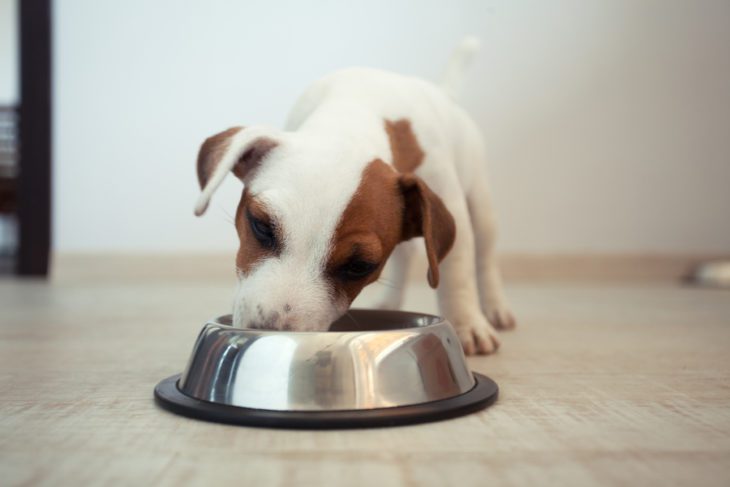

Some foods are to be avoided for puppies, this is called the food allergen. Eggs, dairy products, but also some cereals are to be excluded from your pet’s diet. For puppies, a balanced diet does not mean varying foods. The frequent and brutal change of the diet makes vulnerable the intestinal flora of the puppy. This can cause a disturbance in the digestive transit causing flatulence, diarrhea or even skin reactions.
Between 2 and 4 months, you can feed your puppy 3 times a day. This will help to re-start caloric intake during the day and prevent hypoglycaemia especially for small dogs. From 4 months, you can feed him 2 times a day. The puppy’s meal should not exceed 30 minutes to avoid capricious behavior around the food. Meal time must be regular. But on the other hand the water is to let at will for a good hydration and to change it at least 2 times a day.
There are things you can not give to your puppy to be healthy. You do not have to give it leftover tables, these are not suited to the nutritional needs of the puppy. Red meat can also be an allergenic food, so it should be avoided. To keep up with your puppy’s good growth, weigh it at least every month.
How much food to give to your puppy?
For small stomachs of puppies, feeding is dangerous. Even if they have a big appetite, take care to give your puppy small regular amounts depending on his age. The frequency will decrease as it ages. For example, up to 4 meals a day for puppies aged 2 to 3 months, 2 to 3 meals for 4-6 months and 2 meals for more than 6 months.
Make it a habit to follow the advice given on the food package in terms of quantity. You will avoid problems of obesity and health for your dog, but also of waste.
Moreover, for its well-being take care to take the following precautions:
Importance of breastfeeding your puppy
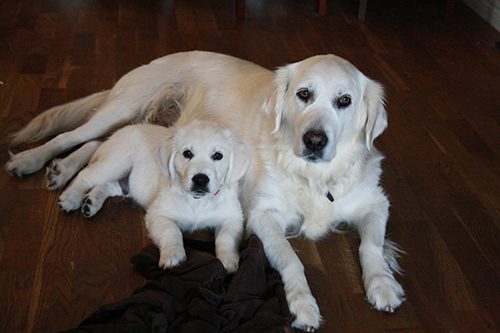

Breastfeeding lasts 7 weeks. During this period, the dog will have increased food needs. At the birth of the puppies and until the third day after bottling, the milk that the female dog offers to her young is actually colostrum. This colostrum is a secretion produced by the mammary gland containing many nutrients and maternal antibodies. Newborn puppies do not have an immune system and it is this colostrum that will provide protection against infections.
Milk production itself occurs within 1 to 3 days after delivery and is maximum from the third to the fifth week. During the period of breastfeeding, a very large part of the metabolism of energy is mobilized for production of milk. Its energy needs are assured and must be filled by a richer diet. It is therefore necessary to increase the ration of usual food of the female dog by multiplying by 3 or by 4. Of course, it is advisable to split his meals up to 4 per day.


